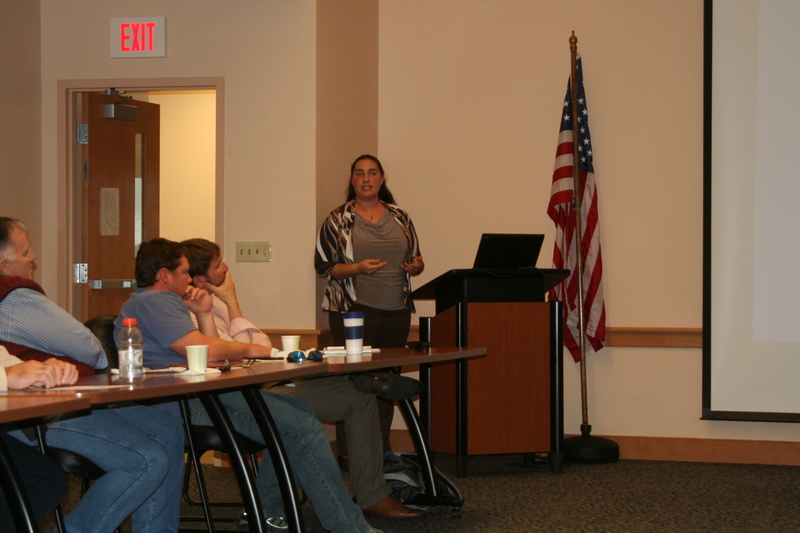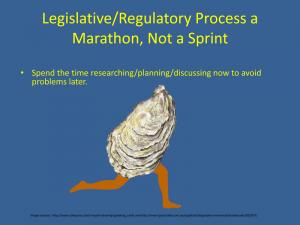DNREC to issue aquaculture regs in July

Delaware is developing aquaculture rules and regulations that would govern commercial fish farming in Inland Bays.
Experts advise those who might be interested in getting started in the business should thoroughly research what it takes and monitor and participate as the state works toward the July 2014 target to have regulations in place.
The Delaware Aquaculture Act establishes a comprehensive program to promote and encourage aquatic farming.
But the more difficult task of establishing rules and regulations for the First State’s aquaculture program is going to require input from the scientific community, those with prior aquaculture experience and the public.
Zina Hense, an environmental scientist with the Department of Natural Resources & Environmental Control, Division of Fish & Wildlife, updated Center for the Inland Bays Scientific & Technical Advisory Committee members at the panel’s December meeting.
Hense said Delaware is the only Atlantic Coast state with no aquaculture, but that gives the state one advantage: Delaware can learn from the mistakes of other states. No one is shellfish farming in Delaware.
An annual fee of $100 per acre for administration of a shellfish aquaculture lease will apply to Delaware residents, resident partnerships or resident corporations, and nonresidents, nonresident partnerships and nonresident corporations will pay $1,000 per acre annually.
State law limits the total acres available for shellfish aquaculture leasing in Rehoboth Bay and Indian River Bay to 5 percent of the total subaqueous lands in each, and no more than 10 percent of the total subaqueous lands in Little Assawoman Bay.
The state regulates all tidal waters up to the mean high water line, in addition to nontidal rivers, streams, lakes, ponds, bays and inlets but not including private subaqueous lands.
The specific sites to be leased will be decided after public workshops to discuss regulations.
Developing regulations
Hense said the First State’s aquaculture program will not be based on any other state’s, but it could adopt ideas from Connecticut, Maryland, Maine, New Jersey, New York, Rhode Island and Virginia.
She said Delaware scientists and policy makers have consulted with aquaculture professionals in each of those states.
Regulations must be detailed and comprehensive, she said. For example, she said a few methods are used to farm oysters; some are compact and take up less open-water surface while others sprawl over several acres.
Oyster farms must be accessible, but they cannot block other users access to navigable waterways and, Hense said, regulations would detail how this is accomplished.
The U.S. Army Corps of Engineers has the authority to permit work and placement of structures in navigable waters.
The corps consults with the U.S. Fish and Wildlife Service, which evaluates project interactions with threatened and endangered species and essential fish habitat before granting permits.
Also to be defined are methods of anchoring materials oysters grow on and types of surface markers to indicate where they are.
Before regulations are implemented, workshops and public hearings will be scheduled to provide information and take comment.
Aquaculture sider
Aquaculture: Many rules must be established
Rules and regulations for Delaware’s embryonic aquaculture industry are being developed and are expected to be in place by July.
Because this is Delaware’s first step into commercial fish farming, the state is starting with a blank rulebook.
To meet the goal, these are a few things that must be done in the coming seven months:
• Establish a lease and regulation schedule
• Determine responsibility for initially marking leased areas and maintaining boundaries
• Setup DNREC permitting and U.S. Army Corps of Engineers approval process
• Establish state costs for staff and equipment
• Make rules for handling disputes, regulation enforcement issues and possible legal proceedings
• Setup vessel and gear inspection and approval
• U.S. Fish & Wildlife Services permitting and Native American tribes and Heritage Program archaeological resources feedback
• Consideration of aquaculture gear’s impact on threatened and endangered species, affect on other waterway users and aesthetics if markers or other materials becomes trash
• Release of draft regulations to public
• Public workshops on draft regulations























































